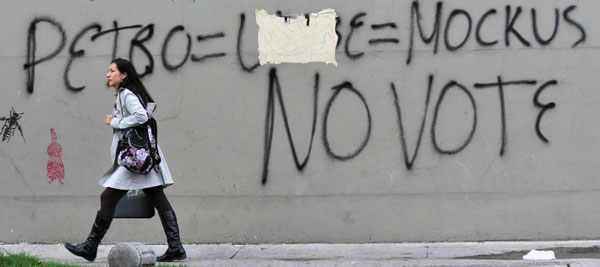A presidential initiative takes Texas to new heights
“We should become the nation’s most important source of expertise about Latin America,” former University of Texas President Larry Faulkner declared in his first State of the University address on Oct. 6, 1998. By prioritizing Latin America, Faulkner was harnessing one of the university’s assets — physical proximity to a region of strategic importance to the United States and Texas. Faulkner’s initiative has helped support the Department of Government’s own Latin American boom over the last decade. The department now houses a full time faculty of eight Latin America specialists, many of whom are also affiliated with the Teresa Lozano Long Institute of Latin American Studies (LLILAS), and hosts an internationally diverse student body from the region.

Most telling, the department’s graduate students are excelling, having published 12 articles related to Latin America in leading academic journals since 2005.
This was the vision of philanthropists Joe and Teresa Lozano Long when they announced in 2000 a $10 million gift to endow Latin American studies at the university, stating: “We hope that this investment will help attract the very top graduate students from the United States and Latin America.”
The department’s graduate students have published articles on such topics as the effect of international migration on democracy, the relationships between partisanship and fiscal policies, citizen disenchantment with democracy, social sector reform, judicial reform, bureaucratic autonomy, judicial independence, judicial activism and corruption.
Most of these authors have benefited from the Latin America student-faculty working group, convened periodically to review and critique proposed article manuscripts or dissertations.
This is all bolstered by a highly active faculty.
In the last 10 years, they have collectively published a dozen books in some of the most prestigious presses in the field. The faculty has also published more articles in the journals “Comparative Politics” and “World Politics,” over the last five years, than professors from any other school in the country. Most of the articles have been written by the department’s Latin America specialists.
The department has considerable expertise in democratization. In recent issues of the journal “Comparative Political Studies,” Associate Professor Kenneth Greene, Assistant Professor Zachary Elkins and Lozano Long Professor of Latin American Politics Kurt Weyland, in separate articles, provided crash courses on how democratic government takes or does not take hold across the world.
“These colleagues are doing path-breaking work on one of the key issues of our time,” Government Department Chairman Gary Freeman says.
The current group of scholars has expertise in countries ranging from Argentina and Brazil in the southern cone to Bolivia and Peru in the Andes and Nicaragua and Mexico in Central and North America. These scholars are also known for their methodological pluralism. They employ methods ranging from ethnographies and qualitative case studies to statistical analyses and mathematical models.
Topics under investigation include the rise of left wing parties, racial and ethnic politics, the judiciary and the rule of law, the diffusion of democracy, specific constitutional models, and economic and social policy reforms that have swept across multiple regions of the world, including Latin America.
With the largest Latin American institute (LLILAS) and the most important Latin American library (the Benson collection) in the country, not to mention the expertise housed in various departments and schools across campus, The University of Texas at Austin is poised to remain among the top universities producing scholarship on the region.
